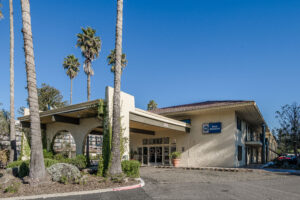The Coronavirus Has Already Cost the City 150,000 Hotel Nights
The Coronavirus Has Already Cost the City 150,000 Hotel Nights
San Francisco Business Times
03/04/20
The Coronavirus Has Already Cost the City 150,000 Hotel Nights
By Alex Barreira
Coronavirus-related cancellations at the Moscone Center have already cost hotels in the city about 150,000 room nights, according to convention officials and Business Times estimates.
At least six large scheduled meetings have been canceled at the city’s convention center, with some meeting organizers opting to hold virtual conferences so attendees do not have to travel and congregate in large groups.
Officials say it’s too early to quantify the economic impact so far, but the loss of those tens of thousands of attendees is expected to have a ripple effect across the city, with restaurants and other tourist-related businesses expected to suffer revenue declines and potentially smaller profits.
“It’s going to be very, very painful,” said Laurie Thomas, executive director of the Golden Gate Restaurant Association, whose membership includes hundreds of eateries in the city. She said food businesses she’s spoken with have lost “easily over $1 million” just in the week since event cancellations began to gather pace. “I thought I’d never have to plan for this.”
As of Wednesday night, those cancellations include the Game Developers Conference, Google Cloud Next 2020, Facebook’s annual marketing summit, the Beauty Counter conference, IBM Think 2020 and a Red Hat Summit all at Moscone and and a Gucci fashion show at an undisclosed venue. Additional conferences from Facebook and Google and other events have been scrapped in the South Bay. More cancellations are being announced daily.
“This is a unique and unprecedented situation,” said Naina Ayya, communications manager for the Moscone Center, the Bay Area’s largest convention facility, adding that “there is a significant financial impact to Moscone Center’s operating budget when a short-term cancellation occurs.”
What is worrying everyone, of course, is not so much what happens now, but what happens next.
“How long is this going to go on? That’s the key metric,” said Chris Thornberg, a well-known managing partner at Beacon Economics LLC. “Two months, it doesn’t matter. If it’s nine months, then we’re talking.”
The Moscone Center is renegotiating the terms of each cancellation on a case-by-case basis since the outbreak is outside of the usual terms governing booking agreements.
Moscone General Manager Bob Sauter did not disclose how much of the deposit from the cancelled Google Cloud and Facebook events would be kept or refunded by the Moscone Center, but officials say Facebook is aiming on donating its portion to an undetermined community benefits.
Just last year, Moscone debuted a $550 million expansion.
Hotels brace for the worst
The hotel industry is buckling down for a rough year while carrying on as usual as best it can.
I asked Alan Reay, president of Atlas Hospitality Group in Irvine, whether it’s too early to consider how reduced occupancy rates will impact employee supply for cleaning staff, who are typically hired on a short-term basis based on occupancy rates.
“No question,” Reay said. “As occupancy drops you’ll see hotels looking to save expenses.
He added that the concern surrounding virus transmission will likely depress travel for a period even after restrictions are eventually lifted.
“It’s not like a light switch, you can’t just switch it back on,” Reay said. “Even if this dies down in the summer, 2020 will be a year that negatively impacts the hotel industry.”
Thornberg, however, was skeptical that the virus and its outbreak around the world poses a major threat yet to the hospitality industry in California or the economy, calling it for now “a profit hit, nothing more.”
He added that even if hotels have a down year, the year after things quiet down typically see a surge in demand with a chance to favorably raise rates and recoup most if not all of the losses in 2020.
A trying time for restaurants
The restaurant association’s Thomas said she is budgeting with the expectation of a 50 percent drop in traffic in the coming months to either of her two restaurants in the city. She encouraged other restaurants not to panic, but to re-examine their own finances without rose-colored glasses. Even well-performing restaurants are only working with an 8 percent margin, she added.
“You need to hold all the cash you can right now,” Thomas said, noting the industry’s notoriously-thin margins.
Thomas said she is appreciative of Mayor London Breed’s declaration of a state of emergency last week as a precautionary measure and holds out hope that some of the funds flowing into the city could eventually find their way to hard-hit restaurants.
But beyond doubling down on hygiene practices and encouraging locals to support restaurants in a difficult time, Thomas emphasized the need to plan for March to be a rough month for restaurants throughout the city in what’s usually a great time of year for them.
Thomas said she and other restaurateurs are concerned they could take an even bigger hit if the Bay Area sees a proliferation of COVID-19 cases and enacts containment measures to close down public spaces, as is being done in other countries grappling with a sudden outbreak.
“We’re not there yet but if or when we are, that will have a drastic effect for small and medium restaurants,” Thomas said.
Adriene Roche, a business development specialist at The City POS based in San Rafael, said that restaurants will need to get creative to weather this rough patch. She said clients have tried marketing new specials, email campaigns and prices that vary by hour. As people become less incentivized to mill about the city, restaurants can try upping their promotions for delivery services such as UberEats and DoorDash, she said.
The outlook at SFO
SFO is losing about $1 million in revenue per month from airline landing fees, concessions and duty free shopping as a result of travel restrictions and reduced demand, according to spokesperson Doug Yakel.
Flights out of SFO to China have been cancelled since the end of last month.
SFO is somewhat insulated from the impacts of widespread travel bans because about 1 in 4 flights are international, with flights serving the China market accounting for just 1.6 percent of total flights. Even if current losses continued for the rest of the year, Yakel said, it would amount to just 1% of the airport’s annual budget.
In March there will be 50% less flights scheduled to South Korea, 25% less to Singapore, 11% less to Taiwan, 6% less to Japan, Yakel said. SFO doesn’t serve flights to Italy or Iran, where large outbreaks of COVID-19 have been reported.


